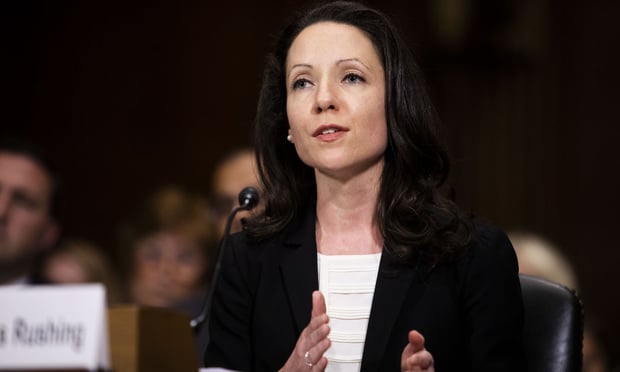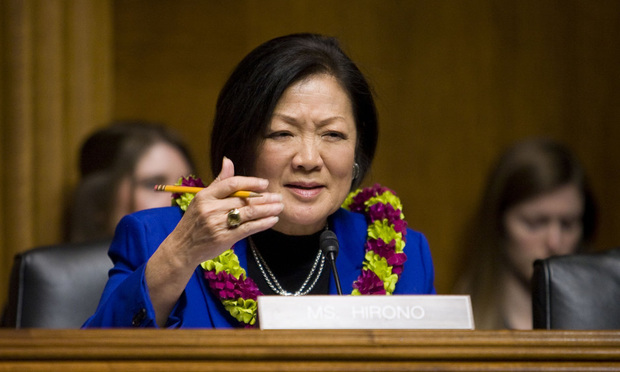Democrats Pressed 36-Year-Old Circuit Pick on 'Life Experience'
"Virtually all of my partners at Williams & Connolly LLP, who are a politically and demographically diverse group, have submitted a letter supporting my nomination," Allison Jones Rushing said in written responses to Senate Democrats.
November 15, 2018 at 03:12 PM
6 minute read
 Allison Jones Rushing testified in October before the Senate Judiciary Committee during her confirmation hearing to be a judge on the U.S. Court of Appeals for the Fourth Circuit. (Photo: Diego M. Radzinschi / ALM)
Allison Jones Rushing testified in October before the Senate Judiciary Committee during her confirmation hearing to be a judge on the U.S. Court of Appeals for the Fourth Circuit. (Photo: Diego M. Radzinschi / ALM)
Williams & Connolly partner Allison Jones Rushing, in line to become one of the youngest federal appellate judges in the country, defended her “life experience” and her work for an anti-LGBT organization in response to written questions from Senate Judiciary Democratic members.
Committee Democrats did not attend Rushing's Oct. 17 confirmation hearing on her nomination to the U.S. Court of Appeals for the Fourth Circuit. The hearing was scheduled during the Senate's recess for midterm elections, lasted less than hour and was held with only two committee members present, both Republicans.
Democratic members had objected—and continued to object Thursday—to the recess hearings. Sen. Dianne Feinstein of California, the ranking Democrat, had urged Republican leaders to reconvene the confirmation hearing for Rushing and several other Trump nominees. Democrats did send Rushing and other nominees a series of written questions.
In their questions to Rushing, several Democratic members noted that an American Bar Association position says a nominee to the federal bench should have a minimum of 12 years' experience in the practice of law. Rushing graduated from Duke Law School in 2007 and clerked for Justice Clarence Thomas and Justice Neil Gorsuch, when he sat on the Tenth Circuit.
The questions to Rushing, 36, covered the usual areas of precedent and stare decisis, abortion, religious discrimination and more, but a clear concern was Rushing's relative inexperience in the practice of law and her connection to Alliance Defending Freedom.
“You graduated from law school 11 years ago,” wrote Sen. Mazie Hirono of Hawaii. “You have only practiced law for eight of those years. What experiences, other than having handled appeals, over your eight years as a practicing lawyer do you have that qualify you to serve in a lifetime position as a federal circuit court judge?”
 Sen. Mazie Hirono (D-Hawaii). Senate Judiciary Committee. (Photo: Diego M. Radzinschi/ALM)
Sen. Mazie Hirono (D-Hawaii). Senate Judiciary Committee. (Photo: Diego M. Radzinschi/ALM)Rushing emphasized the diverse subjects of her appellate practice at Williams & Connolly, where she has worked since 2011 and been a partner since last year. She also noted a “substantial majority” on an ABA committee ranked her “qualified.”
“Virtually all of my partners at Williams & Connolly LLP, who are a politically and demographically diverse group, have submitted a letter supporting my nomination. Attorneys who clerked with me at the Supreme Court, from every active Justice's chambers, have submitted a letter of support,” Rushing said in her written responses.
Rushing said that “preparation for the federal appellate bench is not merely a matter of years but of accruing the relevant experience. I have extensive experience relevant to the work of a federal appellate judge.” She told senators she has filed more than 45 briefs in the Supreme Court and has argued in federal and state appeals courts.
Sen. Kamala Harris, D-California, noted that research by the Brookings Institution, a liberal think tank, found that, for the last 30 years, the average age of circuit court judges upon appointment has been 50. She asked Rushing why she thought those judges were appointed at that age. Rushing responded: “I have not researched the accuracy of, or reasons for, this statistic.”
The questions from Democrats were not out of the blue. At Rushing's confirmation hearing last month, Sen. John Kennedy, R-Louisiana, asked the nominee why she thought she was qualified for the circuit court having only graduated from law school 11 years ago.
“I'm not trying to be rude. I can see your resume. You're a rock star,” Kennedy, presiding over Wednesday's hearing, said. “But I think to be a really good federal judge you've gotta have some life experience,” Kennedy said at the hearing.
Rushing responded to Kennedy: “My experience in the federal courts of appeals and the Supreme Court are why I'm qualified,” Rushing said. “Not only the depth of that experience, but the variety. The judges on the courts of appeals get a wide variety of cases, and I have that experience in criminal law, prisoner petitions, products liability, intellectual property, commercial disputes, constitutional issues, a vast array of federal statutes.”
Rushing's experience wasn't the only focal point from Democrats.
A number of Democratic members quizzed Rushing about her internship and later connections to Alliance Defending Freedom, which has been designated a “hate group” by the Southern Poverty Law Center because of its anti-homosexual advocacy. Rushing has served as a speaker at ADF-sponsored events.
“In my experience with ADF, I have not witnessed anyone expressing or advocating hate,” Rushing wrote. “A number of leading Supreme Court practitioners at well-regarded national law firms work with ADF. Members of Congress, including members of this committee, have filed amicus briefs in the Supreme Court supporting ADF's positions. I do not think members of this committee or large reputable law firms would work with a hate group. I certainly would not.”
Senate Judiciary members were scheduled Thursday morning to vote on the nomination of Rushing and more than a dozen other Trump nominees.
Judiciary Chairman Charles Grassley, R-Iowa, held over for another week a committee vote on Rushing and four other appellate court nominees. That is the usual practice following nominees' committee hearings. Grassley rejected a request by Feinstein that those nominees appearing during the Senate's recess be called back for a hearing before the entire committee.
The other circuit court nominees held over were: Sixth Circuit nominees Chad Readler, the U.S. Justice Department principal deputy assistant attorney general, and Ohio Solicitor General Eric Murphy; Perkins Coie partner Eric Miller and Arizona U.S. Magistrate Judge Bridget Bade, both nominated to the Ninth Circuit.
Rushing's full written responses are posted below:
Read more:
Williams & Connolly Partner, Up for 4th Circuit, Discloses $650K Income
Allison Rushing, Fourth Circuit Nominee, Defends Experience
Neomi Rao, Trump's Deregulatory Leader, Gets DC Circuit Nod
Trump's 3rd Circuit Nominee Grilled Over Ties to Chris Christie, Bridgegate
Amid Recess, Four More Trump Picks Sail Through Recess Confirmation Hearing
This content has been archived. It is available through our partners, LexisNexis® and Bloomberg Law.
To view this content, please continue to their sites.
Not a Lexis Subscriber?
Subscribe Now
Not a Bloomberg Law Subscriber?
Subscribe Now
NOT FOR REPRINT
© 2025 ALM Global, LLC, All Rights Reserved. Request academic re-use from www.copyright.com. All other uses, submit a request to [email protected]. For more information visit Asset & Logo Licensing.
You Might Like
View All
Brownstein Adds Former Interior Secretary, Offering 'Strategic Counsel' During New Trump Term
2 minute read
Weil, Loading Up on More Regulatory Talent, Adds SEC Asset Management Co-Chief
3 minute read
FTC Sues PepsiCo for Alleged Price Break to Big-Box Retailer, Incurs Holyoak's Wrath
5 minute read
Supreme Court Will Hear Religious Parents' Bid to Opt Out of LGBTQ-Themed School Books
Trending Stories
Who Got The Work
J. Brugh Lower of Gibbons has entered an appearance for industrial equipment supplier Devco Corporation in a pending trademark infringement lawsuit. The suit, accusing the defendant of selling knock-off Graco products, was filed Dec. 18 in New Jersey District Court by Rivkin Radler on behalf of Graco Inc. and Graco Minnesota. The case, assigned to U.S. District Judge Zahid N. Quraishi, is 3:24-cv-11294, Graco Inc. et al v. Devco Corporation.
Who Got The Work
Rebecca Maller-Stein and Kent A. Yalowitz of Arnold & Porter Kaye Scholer have entered their appearances for Hanaco Venture Capital and its executives, Lior Prosor and David Frankel, in a pending securities lawsuit. The action, filed on Dec. 24 in New York Southern District Court by Zell, Aron & Co. on behalf of Goldeneye Advisors, accuses the defendants of negligently and fraudulently managing the plaintiff's $1 million investment. The case, assigned to U.S. District Judge Vernon S. Broderick, is 1:24-cv-09918, Goldeneye Advisors, LLC v. Hanaco Venture Capital, Ltd. et al.
Who Got The Work
Attorneys from A&O Shearman has stepped in as defense counsel for Toronto-Dominion Bank and other defendants in a pending securities class action. The suit, filed Dec. 11 in New York Southern District Court by Bleichmar Fonti & Auld, accuses the defendants of concealing the bank's 'pervasive' deficiencies in regards to its compliance with the Bank Secrecy Act and the quality of its anti-money laundering controls. The case, assigned to U.S. District Judge Arun Subramanian, is 1:24-cv-09445, Gonzalez v. The Toronto-Dominion Bank et al.
Who Got The Work
Crown Castle International, a Pennsylvania company providing shared communications infrastructure, has turned to Luke D. Wolf of Gordon Rees Scully Mansukhani to fend off a pending breach-of-contract lawsuit. The court action, filed Nov. 25 in Michigan Eastern District Court by Hooper Hathaway PC on behalf of The Town Residences LLC, accuses Crown Castle of failing to transfer approximately $30,000 in utility payments from T-Mobile in breach of a roof-top lease and assignment agreement. The case, assigned to U.S. District Judge Susan K. Declercq, is 2:24-cv-13131, The Town Residences LLC v. T-Mobile US, Inc. et al.
Who Got The Work
Wilfred P. Coronato and Daniel M. Schwartz of McCarter & English have stepped in as defense counsel to Electrolux Home Products Inc. in a pending product liability lawsuit. The court action, filed Nov. 26 in New York Eastern District Court by Poulos Lopiccolo PC and Nagel Rice LLP on behalf of David Stern, alleges that the defendant's refrigerators’ drawers and shelving repeatedly break and fall apart within months after purchase. The case, assigned to U.S. District Judge Joan M. Azrack, is 2:24-cv-08204, Stern v. Electrolux Home Products, Inc.










